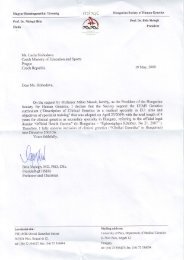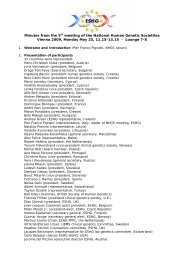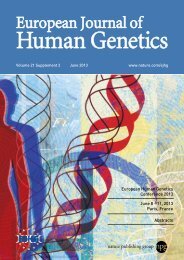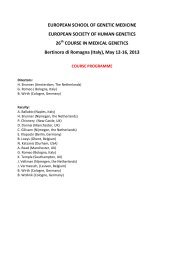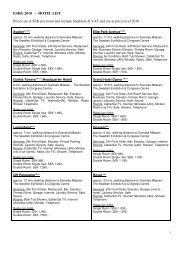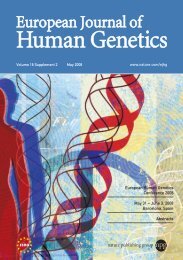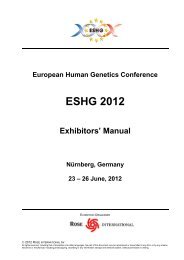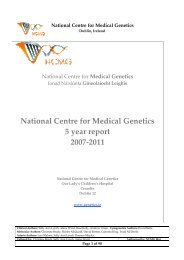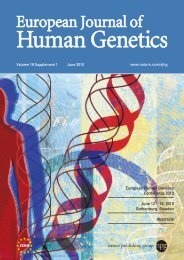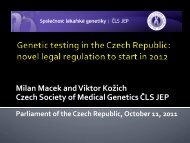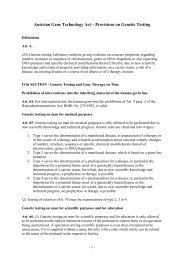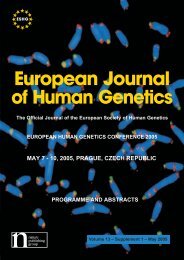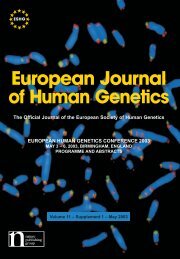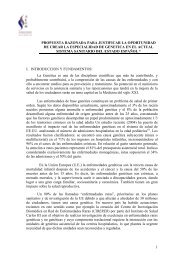2009 Vienna - European Society of Human Genetics
2009 Vienna - European Society of Human Genetics
2009 Vienna - European Society of Human Genetics
You also want an ePaper? Increase the reach of your titles
YUMPU automatically turns print PDFs into web optimized ePapers that Google loves.
Genetic counseling <strong>Genetics</strong> education, Genetic services, and Public policy<br />
P01.40<br />
the role <strong>of</strong> Genetic counseling in Premarital screening program<br />
in saudi Arabia.<br />
A. Al Suliaman, A. Sulaiman, M. Al Mishari, A. Al Sawadi, T. Owaidah;<br />
Department <strong>of</strong> <strong>Genetics</strong>, Research Centre, King Faisal Hospital and Research<br />
Centre, Riyadh, Saudi Arabia.<br />
Haemoglobinopathies are the most inherited disorders worldwide<br />
including Saudi Arabia which can be preventable with application <strong>of</strong><br />
screening programmers. Ministry <strong>of</strong> Health in Saudi Arabia had initiated<br />
premarital screening program in all country regions. The aim <strong>of</strong><br />
this study was to explore the impact <strong>of</strong> the PMS and genetic counseling<br />
on couples at risk for thalassaemia and sickle cell anima in an<br />
area <strong>of</strong> the country with high hemoglobinopathy prevalence. A total<br />
<strong>of</strong> 129 candidates at risk were included, 98% <strong>of</strong> them proceeded with<br />
marriage. Culture pressure was the main reason in more than 48%. Although<br />
most <strong>of</strong> the candidates did not receive genetic counseling yet,<br />
the concept <strong>of</strong> genetic counseling was liked by most <strong>of</strong> them and the<br />
program helped in early detection <strong>of</strong> the disease in their <strong>of</strong>fspring.<br />
P01.41<br />
towards implementation <strong>of</strong> non-invasive prenatal diagnosis in<br />
the UK National Health service<br />
H. Burton, C. Wright;<br />
PHG Foundation, Cambridge, United Kingdom.<br />
Emerging technologies that capitalize on the presence <strong>of</strong> cell-free fetal<br />
nucleic acids in the maternal bloodstream have the potential to transform<br />
prenatal diagnosis and care by allowing non-invasive testing from<br />
as early as 7 weeks. This represents a major advance, since diagnosis<br />
currently requires a later, invasive procedure (amniocentesis or chorionic<br />
villus sampling) with an associated miscarriage risk <strong>of</strong> around 1%.<br />
Many women opt against prenatal testing for this reason, and hundreds<br />
<strong>of</strong> healthy fetuses are lost following testing each year in the UK<br />
alone. Technological applications already in active development are<br />
the determination <strong>of</strong> fetal sex or the diagnosis <strong>of</strong> specific diseases in<br />
the fetus <strong>of</strong> women at high risk <strong>of</strong> inherited disease; the determination<br />
<strong>of</strong> fetal Rhesus blood-group status in Rhesus-negative women at high<br />
risk <strong>of</strong> complications <strong>of</strong> pregnancy with a Rhesus-positive fetus; and<br />
the diagnosis <strong>of</strong> aneuploidies such as Down Syndrome in the fetus.<br />
The approach may permit diagnosis <strong>of</strong> a wider range <strong>of</strong> genetic diseases<br />
in the future, subject to certain limitations, and ultimately could<br />
also allow improved monitoring for complications <strong>of</strong> pregnancy such as<br />
pre-eclampsia. The PHG Foundation has led an expert working group<br />
<strong>of</strong> key UK stakeholders, including National Health Service (NHS) researchers,<br />
clinicians, managers and patient representatives, in an examination<br />
<strong>of</strong> current evidence and associated ethical, legal and social<br />
issues in this area. Findings and strategic recommendations for the<br />
effective and responsible implementation <strong>of</strong> this new technique into<br />
health services in the UK will be presented.<br />
P01.42<br />
Public trust in media and science outreach on genomic studies:<br />
a comparative study between the public and scientists<br />
Z. Yamagata 1 , K. Muto 2 , A. Nagai 1 , A. Tamakoshi 3 , I. Ishiyama 4 , T. Maeda 5 , T.<br />
Shirai 6 , K. Kato 6 ;<br />
1 University <strong>of</strong> Yamanashi, Yamanashi, Japan, 2 The University <strong>of</strong> Tokyo, Tokyo,<br />
Japan, 3 Aichi Medical University, Nagakute, Japan, 4 Teikyo Gakuen college,<br />
Yamanashi, Japan, 5 The Institute <strong>of</strong> Statistical Mathematics, Tokyo, Japan,<br />
6 Kyoto University, Kyoto, Japan.<br />
Objectives: We’ve been conducting questionnaire surveys since 2005<br />
to explore attitude change on genomic studies <strong>of</strong> the general public in<br />
Japan. To clarify their attitudinal change from science outreach and<br />
media interaction, we compare the two dataset from the general public<br />
(2005 and 2008) and the dataset from Japanese scientists (2007).<br />
Methods: Self-reporting questionnaires were sent regarding molecular<br />
biology and human genetics/ genomics to the public (2005 and 2008)<br />
and scientists (2007) in Japan. They were asked about their value and<br />
risk cognition towards genome sciences, science outreach and media<br />
interaction. We compared these results with the dataset from 2,171<br />
citizens in 2005 (RR=54.3%), the dataset from 1,613 citizens in 2008<br />
(RR-53.8%), and the dataset from scientists in 2007 (RR=35.1%).<br />
Results: Regarding media interaction, received media on genomic<br />
studies (multiple choices) in 2005 are “TV/Radio” (56.7%), followed by<br />
“Newspapers” (46.3%) and “None” (22.8%). This trend hasn’t changed<br />
in the dataset 2008. “Internet (3%)” and “Lecture series (1.1%) ” are<br />
less requested media from the public. However, scientists responded<br />
that they wanted to provide their research results via “Lecture series<br />
(44.3%)”, “Newspapers (43.4%), “Internet (43.2%)”. “Information on<br />
the Internet” is less trusted media in the public (11.5%) rather than<br />
scientists’ forecast (33.0%). “Information from non-pr<strong>of</strong>it organizations”<br />
are least trusted (7-8%) from both the public and scientists.<br />
Discussions: Citizen journalism plays important roles for science communication<br />
in Europe or South Korea, but not in Japan. We discuss<br />
this results with our coming final survey.<br />
P01.43<br />
Effective strategies to generate public interest and dialogue in<br />
genetics<br />
K. Mathieson1,2 , P. Finegold1,2 , L. E. Holmes1,2 , M. J. Leech1,2 , D. Donnai1,2 , H.<br />
R. Middleton-Price1,2 ;<br />
1 2 Nowgen, Manchester, United Kingdom, The University <strong>of</strong> Manchester, United<br />
Kingdom.<br />
Public engagement is central to Nowgen’s work, as we believe that the<br />
public need to be involved in shaping the future <strong>of</strong> genetic medicine.<br />
We aim to empower citizens to make informed decisions about new<br />
genetic technologies and health services. Nowgen is highly regarded<br />
in its work related to education and dialogue and is becoming increasingly<br />
involved in influencing policy at local and national level.<br />
Nowgen has developed a comprehensive public engagement programme<br />
that incorporates a broad range <strong>of</strong> approaches, including: debates,<br />
exhibitions, working with artists, filming with teenagers, population<br />
surveys and patient engagement. Our most successful strategy<br />
has been to combine the display <strong>of</strong> visually engaging materials in the<br />
community, with events involving leading academics. This approach<br />
has stimulated public interest, generated significant media coverage<br />
and provided opportunities for the public to find out more from experts<br />
and discuss their views on scientific issues.<br />
Two recent projects led by Nowgen have exemplified this approach.<br />
‘Faces <strong>of</strong> Manchester’ involved the production <strong>of</strong> artwork about the<br />
human face, alongside events exploring human identity and genetics.<br />
‘Our Kid’ led to the development <strong>of</strong> a multimedia sculpture displaying<br />
over thirty short films, alongside events highlighting biomedical<br />
research.<br />
An independent evaluator has reported on the impact on these projects,<br />
finding that overall the audience response was very positive. The<br />
main strengths <strong>of</strong> the projects were to work with numerous community<br />
partners and use innovative, creative approaches to generate public<br />
interest.<br />
P01.44<br />
Belgian strategies and actions for rare diseases<br />
E. Swinnen, J. Cassiman;<br />
Catholic University <strong>of</strong> Leuven, Centre <strong>of</strong> <strong>Human</strong> <strong>Genetics</strong>, Leuven, Belgium.<br />
All rare diseases (prevalence <strong>of</strong> less than 1/2000) combined affect<br />
around 8 % <strong>of</strong> the population and are a public health priority <strong>of</strong> the<br />
<strong>European</strong> Union since 1999. A community action program (1295/99/<br />
EC) <strong>of</strong> the <strong>European</strong> Commission asked all member states to adopt<br />
a “national plan” on rare diseases by 2011. Belgium, internationally<br />
respected for its medical infrastructure, services and research, can<br />
also improve its suboptimal health care framework to address rare<br />
diseases.<br />
The Belgian taskforce on rare diseases and orphan drugs, supported<br />
by the King Baudouin Foundation since 2006, is composed <strong>of</strong> a multidisciplinary<br />
team <strong>of</strong> stakeholders. Representatives <strong>of</strong> a.o. patient<br />
organisations, public health services and institutes, research centres<br />
and industry have successfully campaigned for a comprehensive Belgian<br />
national plan, in line with the decision <strong>of</strong> the <strong>European</strong> Union.<br />
A strategic approach to improve the situation regarding diagnosis<br />
and treatment as well as the stimulation <strong>of</strong> rare disease research in<br />
Belgium will require many aspects to be considered. Already in place<br />
are e.g. reference centres for certain rare diseases, a framework for<br />
the approval and follow-up <strong>of</strong> orphan drug reimbursement and the Orphanet<br />
Belgium database. The latter is an important resource to build<br />
up for both patients and physicians.<br />
The existing situation with regard to rare diseases in Belgium together<br />
with future plans as well as the progress <strong>of</strong> the Orphanet Belgium database<br />
will be presented.



